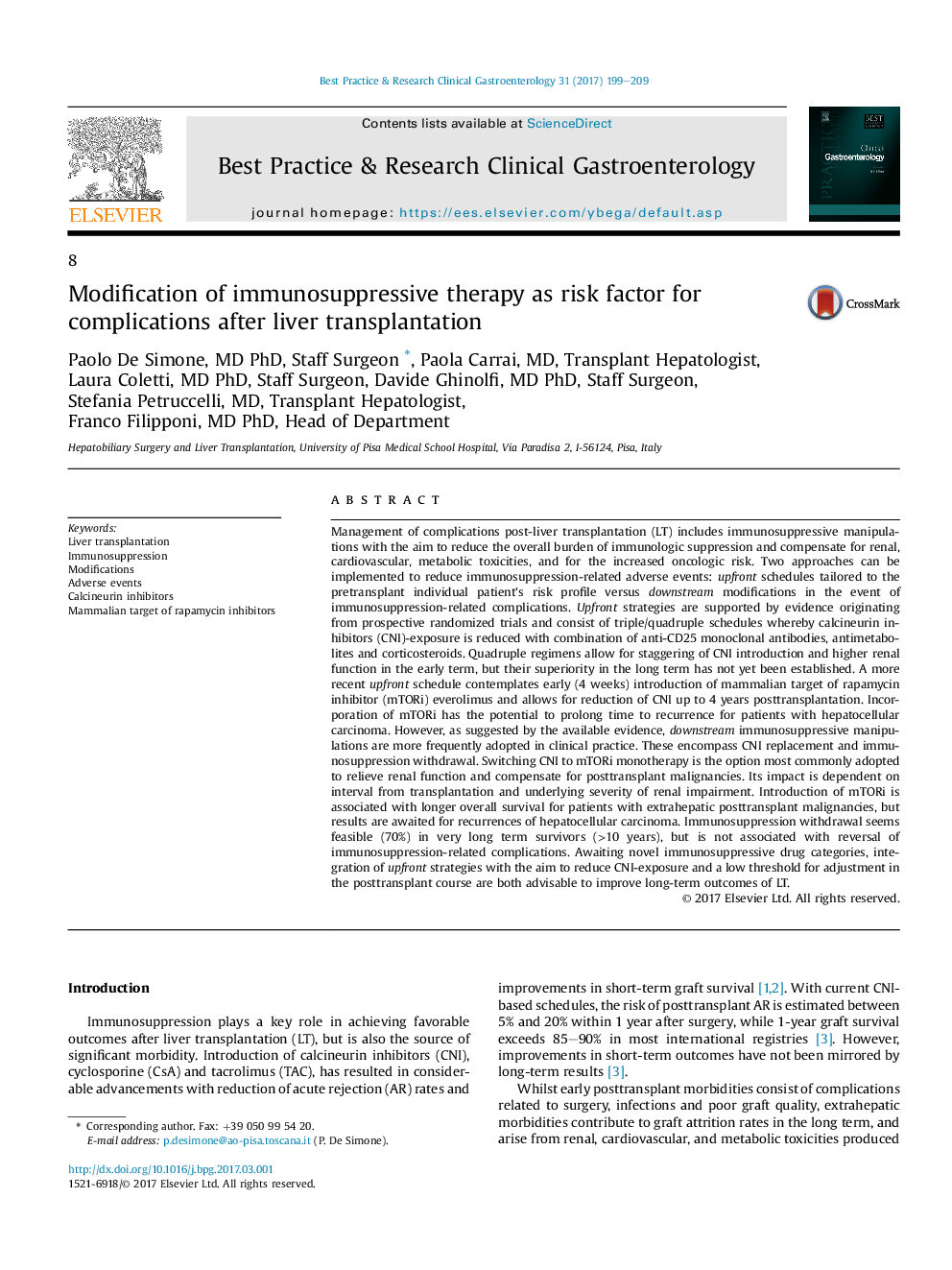| کد مقاله | کد نشریه | سال انتشار | مقاله انگلیسی | نسخه تمام متن |
|---|---|---|---|---|
| 5654515 | 1407282 | 2017 | 11 صفحه PDF | دانلود رایگان |
عنوان انگلیسی مقاله ISI
Modification of immunosuppressive therapy as risk factor for complications after liver transplantation
ترجمه فارسی عنوان
اصلاح درمان سرکوب ایمنی به عنوان عامل خطر برای عوارض پس از پیوند کبد
دانلود مقاله + سفارش ترجمه
دانلود مقاله ISI انگلیسی
رایگان برای ایرانیان
کلمات کلیدی
پیوند کبد، سوء هاضمه ی ایمنی، تغییرات عوارض جانبی، مهارکننده های کالسینورین، هدف پستانداران مهار کننده های رپامایسین،
موضوعات مرتبط
علوم پزشکی و سلامت
پزشکی و دندانپزشکی
غدد درون ریز، دیابت و متابولیسم
چکیده انگلیسی
Management of complications post-liver transplantation (LT) includes immunosuppressive manipulations with the aim to reduce the overall burden of immunologic suppression and compensate for renal, cardiovascular, metabolic toxicities, and for the increased oncologic risk. Two approaches can be implemented to reduce immunosuppression-related adverse events: upfront schedules tailored to the pretransplant individual patient's risk profile versus downstream modifications in the event of immunosuppression-related complications. Upfront strategies are supported by evidence originating from prospective randomized trials and consist of triple/quadruple schedules whereby calcineurin inhibitors (CNI)-exposure is reduced with combination of anti-CD25 monoclonal antibodies, antimetabolites and corticosteroids. Quadruple regimens allow for staggering of CNI introduction and higher renal function in the early term, but their superiority in the long term has not yet been established. A more recent upfront schedule contemplates early (4 weeks) introduction of mammalian target of rapamycin inhibitor (mTORi) everolimus and allows for reduction of CNI up to 4 years posttransplantation. Incorporation of mTORi has the potential to prolong time to recurrence for patients with hepatocellular carcinoma. However, as suggested by the available evidence, downstream immunosuppressive manipulations are more frequently adopted in clinical practice. These encompass CNI replacement and immunosuppression withdrawal. Switching CNI to mTORi monotherapy is the option most commonly adopted to relieve renal function and compensate for posttransplant malignancies. Its impact is dependent on interval from transplantation and underlying severity of renal impairment. Introduction of mTORi is associated with longer overall survival for patients with extrahepatic posttransplant malignancies, but results are awaited for recurrences of hepatocellular carcinoma. Immunosuppression withdrawal seems feasible (70%) in very long term survivors (>10 years), but is not associated with reversal of immunosuppression-related complications. Awaiting novel immunosuppressive drug categories, integration of upfront strategies with the aim to reduce CNI-exposure and a low threshold for adjustment in the posttransplant course are both advisable to improve long-term outcomes of LT.
ناشر
Database: Elsevier - ScienceDirect (ساینس دایرکت)
Journal: Best Practice & Research Clinical Gastroenterology - Volume 31, Issue 2, April 2017, Pages 199-209
Journal: Best Practice & Research Clinical Gastroenterology - Volume 31, Issue 2, April 2017, Pages 199-209
نویسندگان
Paolo MD PhD, Staff Surgeon, Paola MD, Transplant Hepatologist, Laura MD PhD, Staff Surgeon, Davide MD PhD, Staff Surgeon, Stefania MD, Transplant Hepatologist, Franco MD PhD, Head of Department,
